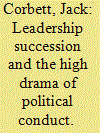| Srl | Item |
| 1 |
ID:
136142


|
|
|
|
|
| Summary/Abstract |
In building Samoan academic researcher capacity in Samoa, we argue that there is a need to first establish the kind of researcher community advocated by Linda Tuhiwai Smith, and to do so through developing research tools, such as the talanoa and faafaletui, in partnership with researcher capacity-building initiatives such as the applied postgraduate social and health research methods course (coded PUBX731-HSA505) run by the Centre for International Health, University of Otago, in partnership with the National University of Samoa. This paper offers a commentary on the talanoa and faafaletui as Pacific research methodologies, and asks what its value might be for researchers in Samoa. It reflects on the learning experiences of staff and students of the applied social and health research methods course in relation to the talanoa and faafaletui as Pacific research methodologies or methods. It concludes that developing Pacific research and researcher capacity in Pacific Island countries, such as Samoa, must include opening up spaces within these communities to critically engage what is Pacific or Samoan or indigenous about these research tools, methods or methodologies, and how they might differ in form or substance from other methods or methodologies.
|
|
|
|
|
|
|
|
|
|
|
|
|
|
|
|
| 2 |
ID:
135115


|
|
|
|
|
| Summary/Abstract |
Politicians in the Pacific Islands are regularly accused of corruption and yet, paradoxically, they also tend to be the most vocal public commentators when incidents of misconduct arise, with accusation and counter-accusation all part of the political theatre. Given their central role in these debates, we ask how politicians interpret political conduct. Based on interviews and public comments, we explore the meanings and beliefs that politicians in Samoa ascribe to three interrelated cases where the actions of their colleagues are under scrutiny. We find a series of divergent and conflicting views. We add to the literature on corruption, both in the Pacific and more generally, by showing how questions about conduct not only vary according to context but are invariably rooted in the cut and thrust of everyday politics, which in this case is dominated by the question of leadership succession.
|
|
|
|
|
|
|
|
|
|
|
|
|
|
|
|